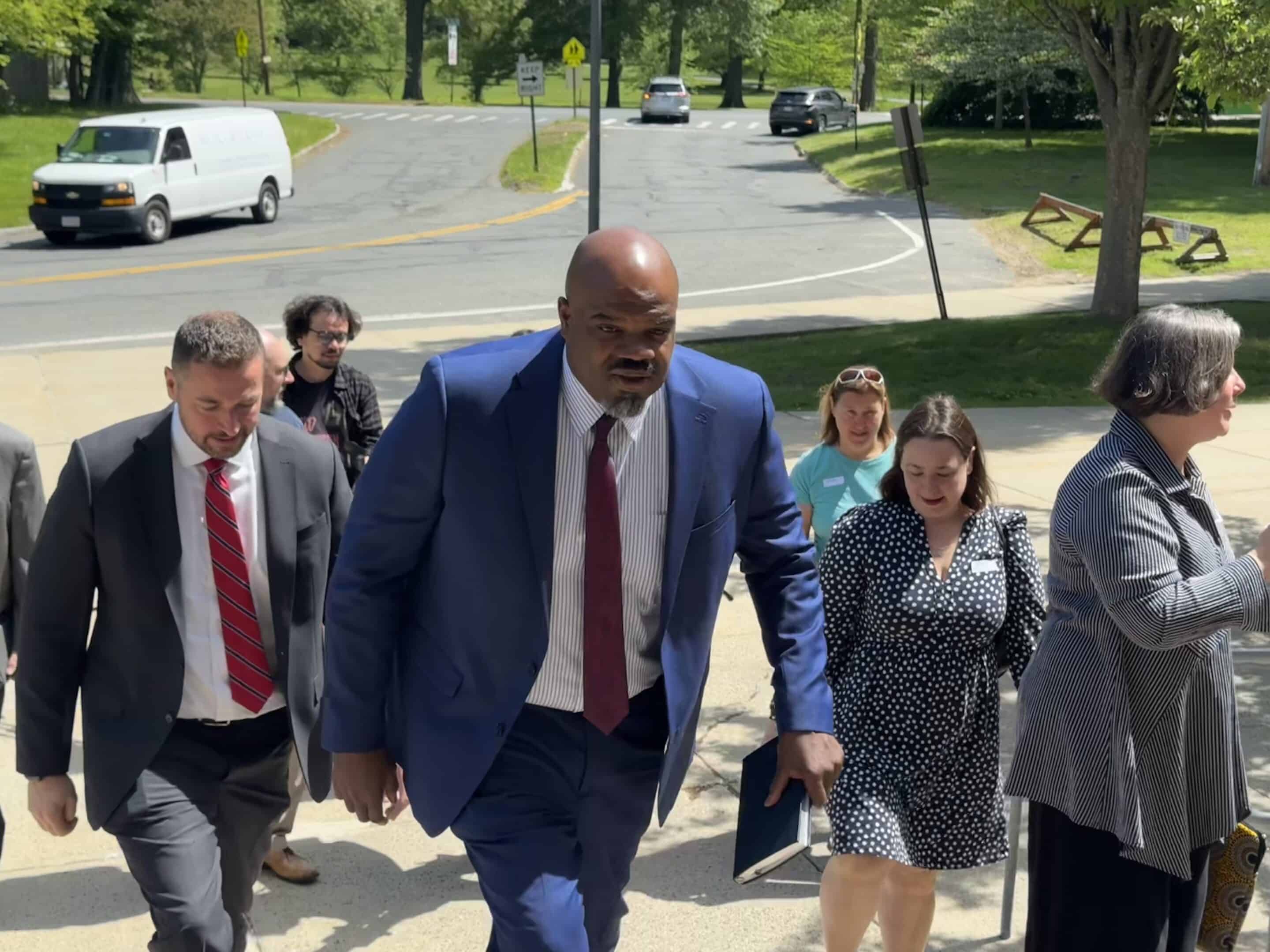Education Secretary Patrick Tutwiler arrives at Northampton High School for a May 27 meeting with Western Mass. school districts to engage in solutions-oriented conversations on education funding.
Reminder Publishing photo by Trent Levakis
NORTHAMPTON — Massachusetts Education Secretary and interim Department of Elementary and Secondary Education Commissioner Dr. Patrick Tutwiler visited Northampton High School on May 27 to meet and hear from the students and representatives from several Western Mass. districts about their concerns on proper school funding.
The meeting was organized by the Northampton Youth Commission with the goal of engaging with Tutwiler in a solutions-oriented conversation on education funding. The Youth Commission is the official city body dedicated to representing young people in Northampton.
“I am incredibly grateful to the secretary, his team and all participants in today’s event,” said Amelia Durbin, co-chair of the Youth Commission and chair of its budget subcommittee. “These are important conversations to be having and I am so appreciative of the Secretary’s willingness to listen and respond to our experiences and concerns.”
The Youth Commission is comprised of youth ages 13-18 and works to better Northampton with youth voices and futures in mind. They work directly with elected leaders along with local community organizations to advocate, draft legislation and lobby for policies that benefit young people and the community as a whole.
The superintendents, educators, school committee members, city councilors and students participating in the meeting inside the Northampton High School auditorium represented the Amherst-Pelham Regional School District, Gateway Regional School District, Hadley Public schools, Hampshire Regional School District, Hatfield Public Schools, Northampton Public Schools and Pioneer Valley Regional School District.
Local and state leaders also in attendance included Northampton Mayor Gina-Louise Sciarra, state Sen. Jo Comerford (D-Northampton), state Rep. Lindsay Sabadosa (D-Northampton) and Kristen Elechko, director of the governor’s Western Mass. office.
The bulk of the meeting saw representatives from each district provide a brief presentation on the funding state of their district, what the core of these issues stems from and how collaboration with the state and Secretary Tutwiler can help. Many of the districts highlighted shared concerns like regional transportation reimbursements, special education funding and the overall restructuring of funding formulas.
The event was organized to highlight these concerns and the various voices from staff or students who are experiencing firsthand issues from lack of funding.
Specific calls were made also for the state to create a new foundation budget review commission and revisit the municipal contribution levels, something that has not been done in 17 years.
“To put that number into perspective, 17 years is longer than I have been alive,” said junior Helen Tejirian. “During my entire lifetime, our state has relied on one municipal contribution formula, even as fiscal capacity and priorities change.”
Hadley Public Schools Superintendent Anne McKenzie highlighted the impact of charter school funding formulas on her district and some of the others attending.
“The current charter school funding formula, no surprise, disadvantages districts with declining enrollment and districts that receive limited Chapter 70 increases,” McKenzie said. She explained that between fiscal years 2015 and 2024, the net costs for school districts regarding charter schools went up by 101%. During that same time period, Chapter 70 aid has increased by only 50%, statewide.
Many speakers called on the flaws of Chapter 70, legislation aimed at funding education that makes sure there are minimum spending requirements for each district, as well as for equitable and fair education. Many districts in rural areas have been facing budget shortfalls and limited resources for students as tense budgeting seasons continue in various communities.
Following the presentations, Secretary Tutwiler responded with gratitude for the opportunity to have this meeting and gave thanks to the Youth Commission for their efforts organizing it.
“I am just so heartened by the students and their presentation, the Youth Commission; I had the opportunity to chat with you earlier in the school year. The opportunity to come back and hear directly from you along with your counterparts in other communities in really meaningful to me,” Tutwiler said.
Tutwiler then began a brief Q&A session where he explained further context of how some of these issues were raised and the ongoing discussions on finding solutions.
“What the [Healey] administration has done is the things that are within its purview,” Tutwiler said. “We are willing partners, should the Legislature decide to take a step to open up Chapter 70 and begin to figure out what shifts need to be made.”
Tutwiler said if the Chapter 70 opportunity arrives, he will be committed to advocating on behalf of the concerns brought to him from the various Western Mass. districts.
“My job is about listening to people and trying to understand their situation so that we can craft both policy and resource allocation proposals that meet your needs,” Tutwiler said. “I understand and respect that there’s a feeling that that has not happened.”
A full recording of the presentations, questions and brief discussion between districts and Tutwiler can be viewed at the NHS Tech YouTube Channel.



